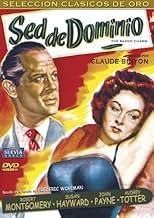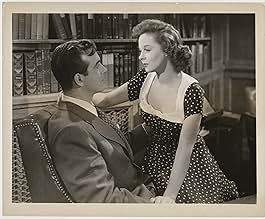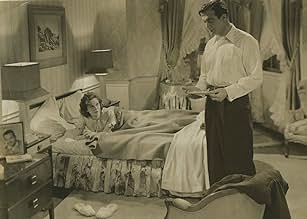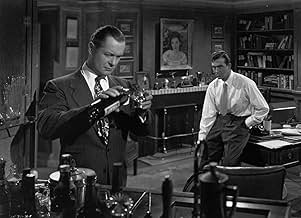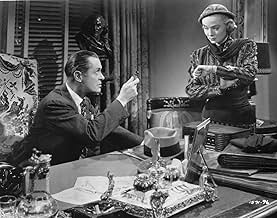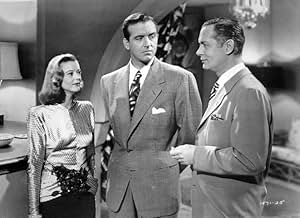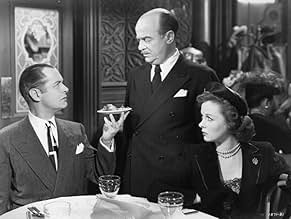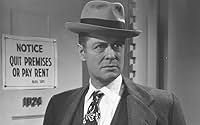In order to get his way, New York producer Matt Saxon manipulates and controls everyone around him but his latest protégé, novelist Eric Busch, finally stands-up to him.In order to get his way, New York producer Matt Saxon manipulates and controls everyone around him but his latest protégé, novelist Eric Busch, finally stands-up to him.In order to get his way, New York producer Matt Saxon manipulates and controls everyone around him but his latest protégé, novelist Eric Busch, finally stands-up to him.
- Director
- Writers
- Stars
- Awards
- 2 wins total
Harry Morgan
- Hermy
- (as Henry Morgan)
Ed Agresti
- Guest at Mexican Inn
- (uncredited)
Fay Baker
- Mrs. Noble
- (uncredited)
John Baragrey
- Peter Stanhope
- (uncredited)
Barbara Billingsley
- Mrs. Maddox
- (uncredited)
Peter Brocco
- Cyril Leatham
- (uncredited)
Laura K. Brooks
- Buxom Nurse
- (uncredited)
Robert Cabal
- Bus Boy
- (uncredited)
Barbara Challis
- Ingenue
- (uncredited)
James Conaty
- Restaurant Patron
- (uncredited)
- Director
- Writers
- All cast & crew
- Production, box office & more at IMDbPro
Featured reviews
Other reviewers here have done a good job describing the plot and praising Montgomery's delightful performance as a scoundrel.
The other lead actors are cast unconventionally. Payne handles a realistic dramatic part very capably and believably. Hayward is very surprisingly convincing as a gentle, soft spoken wife -- showing only briefly, when appropriate, a bit of her usual strong, firey, agressive screen presence. Totter gives a fairly capable performance, though she seems miscast; her sometimes strange facial expressions and mannered body language better suited a character more edgy and dark than the one she's playing here.
I wonder how this cast ended up in this Universal International film. Payne, Hayward, Harry Morgan were all Fox contractees. Totter an MGM player. (Montgomery was freelancing by this time, and made several films released through Universal.)
The other lead actors are cast unconventionally. Payne handles a realistic dramatic part very capably and believably. Hayward is very surprisingly convincing as a gentle, soft spoken wife -- showing only briefly, when appropriate, a bit of her usual strong, firey, agressive screen presence. Totter gives a fairly capable performance, though she seems miscast; her sometimes strange facial expressions and mannered body language better suited a character more edgy and dark than the one she's playing here.
I wonder how this cast ended up in this Universal International film. Payne, Hayward, Harry Morgan were all Fox contractees. Totter an MGM player. (Montgomery was freelancing by this time, and made several films released through Universal.)
For me, one of the best one-liners I've ever heard in a movie was in "The Saxon Charm". Robert Montgomery and company enter a German restaurant in New York City. They are seated at a very bad table. Montgomery insists on a change. Management demurs and won't budge. Montgomery throws a fit and commands his party to follow him out of the restaurant by hissing, "Let's quit this Fascist pest-hole!". I don't remember when I first saw the film, 40 years ago at least, but I've been using that line ever since. I believe, agreeing with an earlier comment, that it was based on David Merrick with Jed Harris being used as a beard; although the author of the comment uses a different turn-of- phrase. I think that the comparison was intended by Frederic Wakeman, who wrote the novel upon which the film was based, and Claude Binyon, it's screenwriter and director. An earlier novel by Wakeman, titled "The Hucksters", was made into the eponymous film starring Clark Gable and Deborah Kerr. His "missing years" were spent in Greece with his wife, Elli Lambeti, a brilliant actress and a great star.
At the height of his career at MGM Robert Montgomery was famous for those society playboys he was always cast as. But if he's remembered at all today it is for the oddball performances that were nothing like those playboy roles. Yellow Jack as a cavalry sergeant, Here Comes Mr. Jordan as a prizefighter, Night Covers All as a homicidal maniac or They Were Expendable as a PT boat skipper and others, these are what we remember Robert Montgomery for. Fitting right in there is The Saxon Charm made after his years with MGM were over. Montgomery is debonair but there's malice in that charm.
Anyone who knew anything about the theater knew that Montgomery was basing his character on Broadway producer Jed Harris. Harris was a theatrical genius with an ego the size of South America and the antics you see here are mild compared to the real deal. Harris was used also by John Barrymore in 20th Century and Warren William in Varsity Show as a model. But in those he was eccentric, here he's a first class heel who thinks he's the center of the world.
Based on his reputations novelist John Payne seeks out Montgomery to produce his play. But Montgomery has to have his own imprint on the work and he weaves Payne into his web. It breaks up Payne's marriage with Susan Hayward in the process. Of course not helping is the clumsy pass Montgomery makes at Hayward.
Best in the film and possibly a career role for her his nightclub singer Audrey Totter who is Montgomery's main squeeze. She's loyal to a fault until Montgomery does deliberate dirt in fact goes out of his way to do it to her. Montgomery is married to Heather Angel, but they have an arrangement that also doesn't end well.
The real Jed Harris probably could have sued. But I suspect he rather enjoyed his reputation as a heel and enjoyed The Saxon Charm just as you will.
Anyone who knew anything about the theater knew that Montgomery was basing his character on Broadway producer Jed Harris. Harris was a theatrical genius with an ego the size of South America and the antics you see here are mild compared to the real deal. Harris was used also by John Barrymore in 20th Century and Warren William in Varsity Show as a model. But in those he was eccentric, here he's a first class heel who thinks he's the center of the world.
Based on his reputations novelist John Payne seeks out Montgomery to produce his play. But Montgomery has to have his own imprint on the work and he weaves Payne into his web. It breaks up Payne's marriage with Susan Hayward in the process. Of course not helping is the clumsy pass Montgomery makes at Hayward.
Best in the film and possibly a career role for her his nightclub singer Audrey Totter who is Montgomery's main squeeze. She's loyal to a fault until Montgomery does deliberate dirt in fact goes out of his way to do it to her. Montgomery is married to Heather Angel, but they have an arrangement that also doesn't end well.
The real Jed Harris probably could have sued. But I suspect he rather enjoyed his reputation as a heel and enjoyed The Saxon Charm just as you will.
As we watch this eponymous character throw his weight around, we are not exactly inundated with any charm (or steamed cabbage). He (Robert Montgomery) is a bully, a snob, and frankly rather an odious Broadway producer. He is introduced to "Eric" (John Payne) and his wife "Janet" (Susan Hayward) when he is told that there is a script to be had. Now "Eric" is a bit green with all of this, and is soon not only rewriting pretty much everything, but his marriage is struggling and he's even bankrolling his supposed impresario (and his long suffering factotum "Hermy" (Henry Morgan). What now ensues is a nicely presented tale of being hoist by your own petard. When people start to scent blood - they combine, connive and find effective ways of exacting their revenge on their erstwhile mentor. Montgomery is actually quite convincing here, but Payne never really did set the heather on fire and we simply don't see enough of Susan Hayward - whose character is not exactly strong, anyway. It's certainly a watchable and decently paced ninety minutes that shines a bit of a light on the Machiavellian theatrical tactics of producers and their rather selfish ways, it could just have been doing with a stronger antagonist for "Saxon".
Robert Montgomery makes the film by his overwhelmingly impressive performance non-stop as an autocratic Broadway producer without any scruples at all - everyone collaborating with him become his victims, eventually ending up as suicides. It's a brilliant script above all, the dialog is intelligent and witty all the way in constant crossfire, making this more of a play than a film. Susan Hayward and Audrey Totter are the women who see him through and ultimately win over him, but not until he has lost everything. His character appears to have been a real phenomenon, the Broadway producer Jed Harris, who in the same way made his way by ruthlessly driving over everyone else and enslaving them in a leash of serfdom. John Payne is the sympathetic writer who gets caught up with him, a novelist who tries writing a play, and in their collaboration the producer's tragedy becomes visible - he could never write anything good himself, he only lived on finding others to write for him, and then he had to destroy them by over-editing their work. John Payne finally evades that ruin by the help of his wife, and the interesting thing is that his play, after being massively over-edited and flopped on Broadway, is then proved a success in its original version. So much for others trying to improve your creativity. Although Robert Montgomery makes an abominable character, the film is his, and his performance is as magnificent as the best of John Barrymore.
Did you know
- TriviaRobert Montgomery patterned his portrayal of a ruthless Broadway producer who lets nothing stand in the way of getting what he wants after Jed Harris, a noted Broadway impresario who had the same reputation.
- GoofsJohn Payne and Susan Hayward are swimming. At 43:11, they swim towards Robert Montgomery's yacht. When they board, at 43:45, Robert Montgomery asks John Payne about the new third act of the play. John pats the pocket of his robe and says he has it. The robe could have been borrowed but where did the script come from? They hadn't been aboard it to this point. (Actually, Eric (Payne) is being sarcastic when he says he has it with him, even in his robe after just swimming.)
- Quotes
Matt Saxon: [Matt is coaching Alma on singing "I'm In The Mood For Love"] Has this thing got a verse?
Alma Wragg: Oh, Matt, no one sings verses anymore. That's old fashioned.
Matt Saxon: Nothing that is good and has a purpose is old fashioned.
- SoundtracksI'm in the Mood for Love
Music by Jimmy McHugh
Lyrics by Dorothy Fields
Sung by Audrey Totter (dubbed by Martha Mears (uncredited))
Details
- Release date
- Country of origin
- Language
- Also known as
- The Charming Matt Saxon
- Filming locations
- Production company
- See more company credits at IMDbPro
- Runtime
- 1h 28m(88 min)
- Color
- Aspect ratio
- 1.37 : 1
Contribute to this page
Suggest an edit or add missing content

